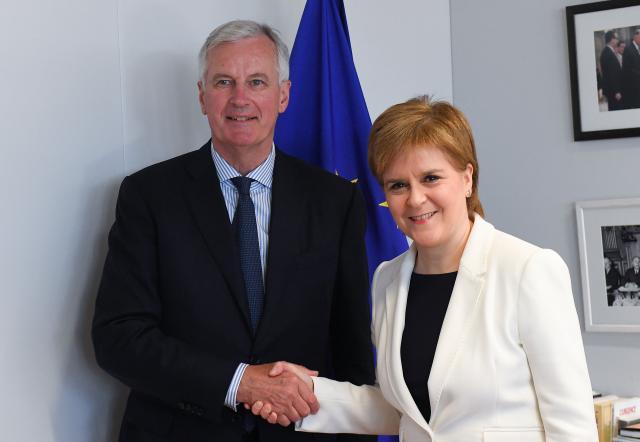The first minister met EU Brexit negotiator Michel Barnier but said she recognized that, despite “massive sympathy” in Brussels for the majority of Scots who voted to stay in the European Union, he would treat only with the British government.
Forecasting that Prime Minister Theresa May may change tack after months of in-fighting within her cabinet and party and seek to keep Britain in the EU’s customs union or even the full single market, Sturgeon repeated her preference for Scotland to remain in both even if the rest of Britain did not.
Among Scotland’s arguments, she cited a risk that Scottish businesses would suffer a competitive disadvantage to neighbors in Northern Ireland if, as the EU is offering, the latter stays broadly within the EU’s economic regulatory system to avoid a disruptive “hard border” with EU member Ireland.
“An outcome that gives Northern Ireland a preferential relationship with the single market raises real issues for Scotland because clearly there would be a competitive disadvantage there,” Sturgeon said, at an event hosted by website Politico.
May has ruled out a planned “backstop” solution contained in draft deal in December by which the EU may keep Northern Ireland in its economic system — something that May, and the Northern Irish allies on which she relies for her slim parliamentary majority, say would isolate the province from the mainland.
May also insists she will not yield to pressure to seek full customs union membership for the whole UK ahead of parliamentary votes on the issue that are dividing her Conservative party.
Sturgeon said she remained hopeful that May would change her position and accept a customs union and possibly single market membership.
She said she expected that to be clear by the autumn, when she would then offer a view on whether Scotland should seek a second referendum to break with London and join the EU. Scotland voted against independence from the UK in 2014. Two years later, in a referendum on EU membership, an overwhelming majority of Scots voted to remain but Britain as a whole voted to leave.
















































